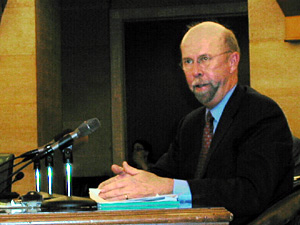|
Audio
Photos
More from MPR
Resources
|
April 21, 2005
Eagan-based Northwest Airlines today announced its first-quarter earnings -- or, rather, its lack of earnings. Northwest lost $440 million between January and March, nearly double its loss in the same period a year ago.
Eagan, Minn. — Speaking to financial analysts and the press on a conference call, Northwest CEO Doug Steenland didn't mince words about the company's performance so far this year.
"Frankly, we are disappointed with our first quarter results," Steenland said, as he began his comments. "They are clearly unacceptable."
The red-tail's red ink of $440 million (or $458 million, including a one-time loss taken on the sale of Pinnacle Airlines) was worse than what most analysts had predicted. Northwest did see revenues rise more than 7 percent over the same period the year before. But costs rose 14 percent, leaving the airline no closer to its goal of financial stability.
As the crisis in the airline industry extends into a fourth year, Steenland tried to reassure investors Northwest can be one of the big airlines left standing.
"With a competitive cost structure -- and in our case it's largely a labor cost issue -- we will be profitable, we will generate sufficient returns to grow the business and to be long-term sustainable," Steenland said.
In December, the airline reached a deal with pilots that will save $300 million this year. Northwest still wants to trim another $800 million a year from wages and benefits across its labor groups. This is enough, Steenland says, to return the airline to profitability and allow it to compete fairly with so-called low-cost airlines like Southwest, as well as airlines like United that have achieved major labor cuts in bankruptcy.
Steenland renewed his call for unions to embrace concessions.
"It is imperative that we reach agreement with our remaining unions and begin a second round of pilot negotiations this year," he said.
One of those remaining unions is the Professional Flight Attendants Association. PFAA spokesman and assistant contract administrator Bob Krabbe says Steenland's message isn't sinking in because Northwest is blaming employee costs for an unrelated, external event: the spike in fuel prices. While Northwest's labor costs in the most recent quarter rose 1.9 percent, the cost of fuel for its aircraft jumped 40 percent.
"Northwest has been beating the drum of, 'We need to cut our labor costs' for a long time," Krabbe said. "But this is almost entirely about fuel. I mean, 1.9 percent versus 40 percent -- that does pretty well say it."
Krabbe says the amount Northwest wants to save in annual labor costs is about the same as what the airline looks to pay in extra fuel costs this year.
CEO Steenland calls the union's view, "uninformed and simplistic." For the company to survive, revenue must match expenses one way or another, he said, and fuel prices are completely out of the airline's control.
In fact, for the rest of the year Northwest will be largely subject to the fluctuation of the oil market. While airlines can lock in a fuel price for future purchases -- called "hedging" -- Northwest has opted not to do so, gambling instead that prices will head down.
The flight attendants union's Krabbe says rising fuel prices are a burden for traveling customers -- not workers -- to bear.
"I know they want to keep ticket prices low," Krabbe said. "But when fuel is what's driving budgets, some of that needs to be passed along to consumers."
Northwest has tried that avenue. It recently led the way on two fare increases that took hold in the industry. But those played out against fare slicing initiated by Delta Airlines. Northwest officials declined to say just how much Delta's "Simplifares" initiative has cost them. It has clearly been no gold mine either for Delta, whose first quarter losses were more than double those of Northwest.
Northwest is lobbying hard right now for reforms to pension law that could bring much-needed savings. Currently the airline faces accelerated payments to shore up its underfunded plans. A bill introduced this week in the U.S. Senate would allow a company like Northwest to freeze its current pensions, spread out its payments, and make the shift to a 401(k)-type system.
The airline's pilots union is on-board with the idea. Spokesman Hal Myers says pilots recognize the strain pension contributions are putting on Northwest.
"We believe the combination of extending these pension payments and possibly combining that with additional changes to the plan may be the solution that we need," Myers said.
Aside from its on-going talks with the airline about the pension issue, the pilots say other labor groups need to ante-up before they'll go back to the table with Northwest. So far there appears to be little movement. One financial analyst asked CEO Steenland what he thought it would take, given that it often takes a major financial crisis for unions to agree to concessions. Steenland answered that workers need only read the news to see just how serious the situation in the industry has become.




